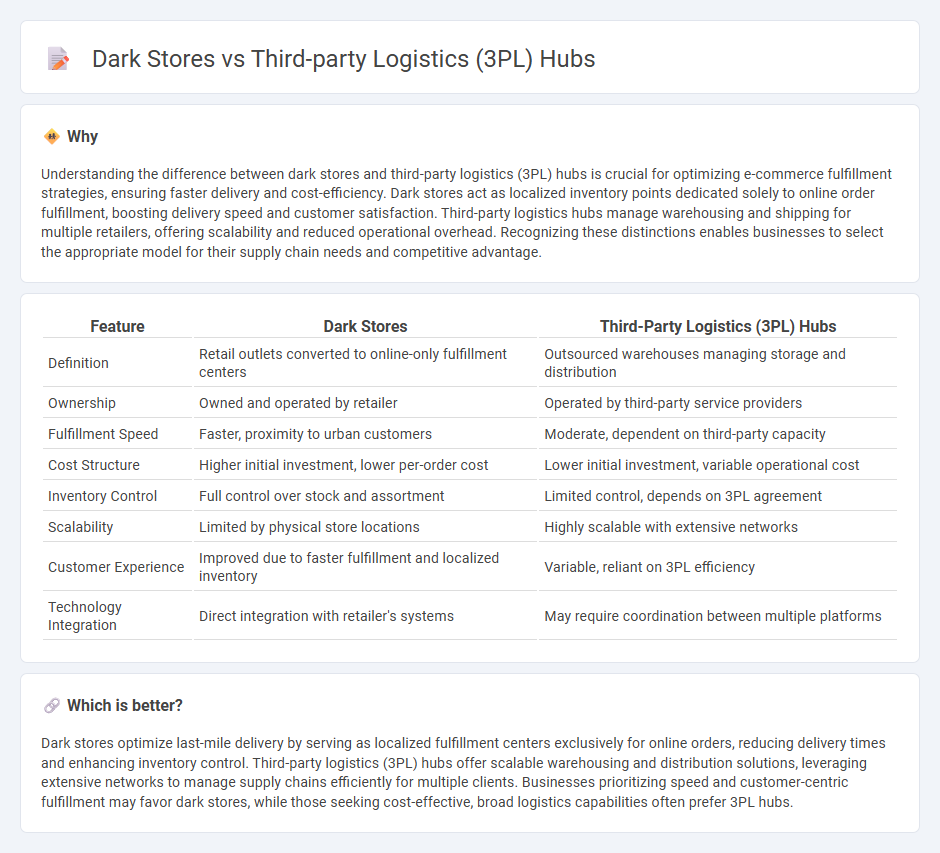
Dark stores function as localized fulfillment centers designed exclusively for online order processing, reducing delivery times and enhancing customer experience. Third-party logistics (3PL) hubs provide comprehensive supply chain management services, including warehousing, inventory management, and transportation, catering to multiple retailers. Explore the advantages and use cases of dark stores versus 3PL hubs to optimize your e-commerce strategy.
Why it is important
Understanding the difference between dark stores and third-party logistics (3PL) hubs is crucial for optimizing e-commerce fulfillment strategies, ensuring faster delivery and cost-efficiency. Dark stores act as localized inventory points dedicated solely to online order fulfillment, boosting delivery speed and customer satisfaction. Third-party logistics hubs manage warehousing and shipping for multiple retailers, offering scalability and reduced operational overhead. Recognizing these distinctions enables businesses to select the appropriate model for their supply chain needs and competitive advantage.
Comparison Table
| Feature | Dark Stores | Third-Party Logistics (3PL) Hubs |
|---|---|---|
| Definition | Retail outlets converted to online-only fulfillment centers | Outsourced warehouses managing storage and distribution |
| Ownership | Owned and operated by retailer | Operated by third-party service providers |
| Fulfillment Speed | Faster, proximity to urban customers | Moderate, dependent on third-party capacity |
| Cost Structure | Higher initial investment, lower per-order cost | Lower initial investment, variable operational cost |
| Inventory Control | Full control over stock and assortment | Limited control, depends on 3PL agreement |
| Scalability | Limited by physical store locations | Highly scalable with extensive networks |
| Customer Experience | Improved due to faster fulfillment and localized inventory | Variable, reliant on 3PL efficiency |
| Technology Integration | Direct integration with retailer's systems | May require coordination between multiple platforms |
Which is better?
Dark stores optimize last-mile delivery by serving as localized fulfillment centers exclusively for online orders, reducing delivery times and enhancing inventory control. Third-party logistics (3PL) hubs offer scalable warehousing and distribution solutions, leveraging extensive networks to manage supply chains efficiently for multiple clients. Businesses prioritizing speed and customer-centric fulfillment may favor dark stores, while those seeking cost-effective, broad logistics capabilities often prefer 3PL hubs.
Connection
Dark stores function as local fulfillment centers optimized for rapid order processing in e-commerce, strategically linked to third-party logistics (3PL) hubs that handle large-scale warehousing and distribution. This connection enables seamless inventory management, faster last-mile delivery, and improved order accuracy by leveraging 3PL expertise in logistics and dark stores' proximity to consumers. The integration of dark stores with 3PL networks enhances supply chain efficiency, reduces delivery times, and supports growing demand in online commerce.
Key Terms
Fulfillment
Third-party logistics (3PL) hubs specialize in comprehensive supply chain management, offering scalable storage, inventory control, and last-mile delivery services to optimize fulfillment efficiency. Dark stores function as localized fulfillment centers designed exclusively for online order picking and rapid dispatch, reducing delivery times in urban areas. Explore more about how 3PL hubs and dark stores innovate e-commerce fulfillment strategies.
Inventory Management
Third-party logistics (3PL) hubs optimize inventory management by leveraging advanced warehouse technologies and real-time tracking systems to streamline order fulfillment and reduce holding costs. Dark stores focus on localized inventory distribution, maximizing product availability for rapid delivery in urban areas through dedicated micro-fulfillment centers. Explore the strategic advantages and operational efficiencies of 3PL hubs and dark stores to enhance your inventory management.
Last-mile Delivery
Third-party logistics (3PL) hubs centralize inventory management and streamline distribution by leveraging vast networks and advanced technology, enhancing efficiency in last-mile delivery for diverse clients. Dark stores act as localized fulfillment centers designed specifically for rapid order processing and immediate dispatch within densely populated urban areas, significantly reducing delivery times. Explore how combining 3PL hubs and dark stores can revolutionize your last-mile delivery strategy.
Source and External Links
Guide to understanding third-party logistics (3PL) - Maersk - 3PL hubs are specialized service providers managing logistics operations such as warehousing, transportation, and fulfillment, enabling businesses to scale efficiently by outsourcing their supply chain and distribution tasks.
The Complete Guide To Third-Party Logistics (3PL) | SEKO - Third-party logistics hubs operate fulfillment centers where products are received, stored, picked, packed, and shipped, often using technology integrations with ecommerce platforms to streamline order fulfillment and enhance customer experience.
What Is a 3PL? How To Choose a Provider in 2025 - Shopify - 3PL hubs can be asset-based with warehouses and transportation or financial- and information-based, providing logistics management, freight auditing, and supply chain visibility, crucial for businesses scaling their operations and managing costs.
 dowidth.com
dowidth.com